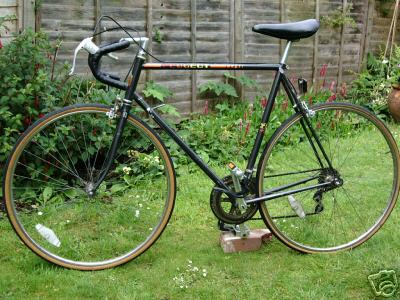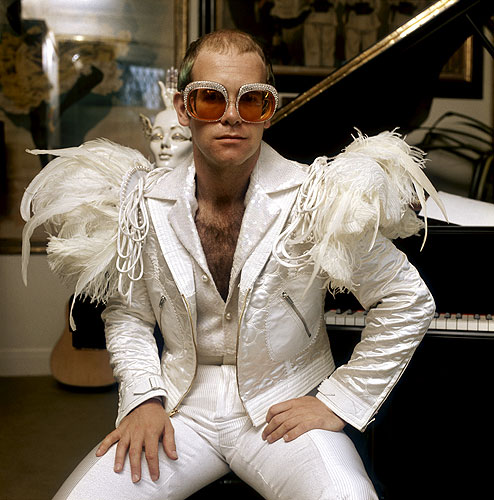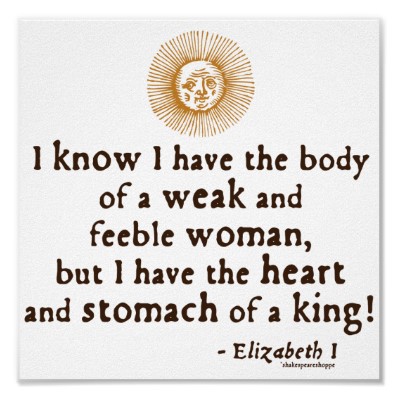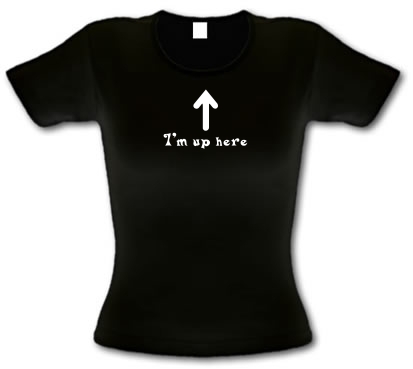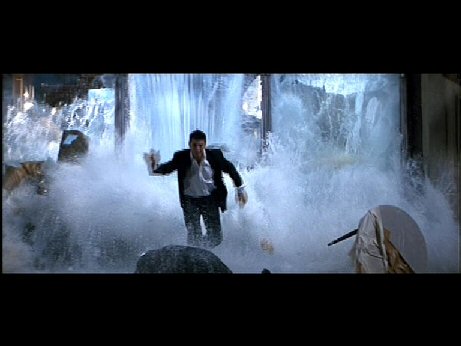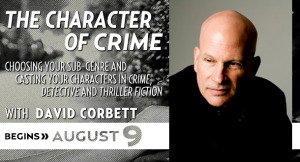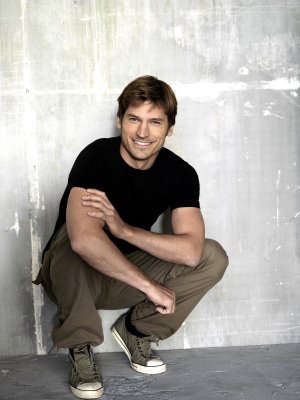(I’m in Australia, teaching an all-day Screenwriting Tricks for Authors workshop today, or maybe that’s tomorrow, so I’ll try to comment tomorrow, or yesterday, or whatever! — Alex, jetlagged…)
A couple of weeks ago I was driving home from a “Noir at the Bar” reading here in L.A., and my favorite radio station was playing a live recording of a Sting concert at the Hollywood Bowl I’d actually been in the audience for, years ago. I always love that multidimensional feeling; it was like being in a time machine taking me back to a night I remember very well, because I’d just sold my first screenplay that month, a huge kick-start to what turned into an eleven-year screenwriting career. Now, when you’re outside the film business, a break like that feels like shattering some enormous, impenetrable glass dome atop the mythical business they call “the movies”, a dome that you’ve been circling for years, trying to figure out the entry point. A familiar feeling for any of us who have ever experienced circling the glass dome of publishing, I imagine!
And it was a great synchronicity, being transported back to that time and that feeling… because I’ve just now broken into e publishing with the launch of my new direct-to-e thriller Huntress Moon and am feeling the same kind of exhilaration of shattering a barrier to a whole new and exciting level of my career. It reminded me how life is a spiral like that. You come back to the exact same points of life, but hopefully you’re constantly moving UP the spiral, taking all your knowledge of that pivotal threshold with you and ascending to a both a higher and a deeper level.
It also reminded me that as writers, we are constantly reinventing ourselves. I would say “having to reinvent ourselves” but that sounds scary and ominous. Oh well, okay, let’s be real. We are constantly HAVING to reinvent ourselves.
I started out as a theater person, from the time I was a kid, really, but after college I quickly switched my ambitions and focus to screenwriting, because I was aware of the practical need to, you know, eat. Knowing nothing about the film business, I moved to L.A. just figuring I would figure it out. And the fact is, I did pretty much just that – I got the classic entry level job into movies, a script reader for various production companies, learned the business and the craft of film writing by reading and reporting on hundreds of scripts in a very short amount of time, wrote my own script with a writing partner, got an agent by using what I’d learned as a script reader, and sold the script to Fox in a bidding war.
Now, the trouble with being a screenwriter, and with Hollywood in general, is that you get caught up in the fact that you’ve MADE IT in a profession that all the naysayers (you know the ones I mean) always told you you would never MAKE IT in, and you’re making great money for doing what you love and the people you’re working with are wildly talented and interesting, and it’s all so exciting and non-stop that it becomes very hard to see when things are not quite working out the way you envisioned. Screenwriters have very little power over their work; the potential movies you work on are very very seldom made, and most of them don’t look like any movie you would want your name on anyway once the script has been through the process very aptly named “development hell.” Cut to ten years later and I had become so creatively miserable, without really knowing it, that it was affecting every other area of my life. And when a movie I’d written that I was truly passionate about fell through when we lost our director to another movie, I snapped. I just wasn’t going to go through that whole thing again.
And that’s how I wrote my first novel, The Harrowing. And all the naysayers started up again, a lot of them inside my own head. “You’ll never make a living in publishing. At least in screenwriting you’re writing AND getting paid…” (insert any profession, you know the drill….) But I knew I had to do something else, so I did, and the book got written, and it got sold, and suddenly a whole other glass dome had been shattered and I was on the rollercoaster of a whole new career, to mix a couple of metaphors. And I was lucky to make the shift when I did, because changes in the film industry have made a screenwriting career exponentially more difficult and creatively frustrating than it was when I started in the business.
But now I had to learn a whole different business and figure out a whole different way of making a living at writing. (NOT making a living was not an option – I’ve been writing professionally for so long I have no other marketable job skills). And publishing is a different way of making a living.
When you start out as an author – well, when I started out as an author, in 2006, people advised that we put our entire first book advance back into promotion. Because that’s how important the lift-off factor is in traditional publishing. I was a total newbie, and got completely obsessed with trying everything there was to try in marketing, all the things I imagine all the authors here have been doing or preparing to do with varying degrees of terror: website, Facebook, Twitter, Google+, Pinterest, blog, grog, blog tours, book tours – oh right, and writing that second book. (If you want a bloodcurdling glimpse into how it was, I’ve blogged about it here: Marketing =Madness).
Well, I made a good launch with The Harrowing – nominations for Stoker and Anthony Awards, significant recognition as a new and interesting female horror writer… but nothing like the brass ring, bestseller status. But I wrote more good books and got more recognition and also figured out how to create multiple income streams in my writing life –like teaching my Screenwriting Tricks for Authors workshop, that I started on my blog and developed into an e workbook (doing the workshops for free at conferences until I was in demand, and then starting to pick and choose my venues and going only where people would pay me, which also turned into self-perpetuating and well-paying promotion, as well as a personally rewarding avocation).
I’m a big believer in diversifying your writing career in the same way that you diversify a financial portfolio; the money is erratic in a writing career, often cyclical, and it’s a huge mistake to think you’ll earn the same income every year – I’ve seen way too many talented screenwriters and authors crash and burn by making that assumption. Invest wisely when you have the money and always keep a cushion for the lean years, because believe me, there are going to be lean years.
But still, I wasn’t published for long before I started getting that uncomfortable feeling again. This time it didn’t take as long for me to figure out that I had to try something different – again. (Watching the publishing industry starting to crumble before my eyes with the rise of e readers and self-publishing was a pretty good clue…)
I truly believe we are in the midst of the biggest revolution since the invention of the printing press. E books, ereaders – it is ALL good news for us as writers, because we have so many more choices now. Look, I know it’s hard enough to just get through the day doing the writing you have to do and the promotion you have to do on top of that. You may be just learning the ropes of traditional publishing and here I am suggesting that you add learning the ropes of e publishing, to boot. Don’t panic! Do what you need to do at whatever step you are on in your career. But if you do find you’re not getting picked up by an agent when you know – and enough credible people have told you – that you’ve got a great book… or you’re not making enough of a living with your traditionally published book(s)… or you are getting a nagging feeling that your publisher is not getting enough of your books out there to be bought and read in the first place… or Barnes & Noble goes bankrupt or something – there is a whole other miraculous option for you now.
In a time of diminishing publisher advances and massive bookstore closures, I and many of my traditionally published author friends who started out in publishing at the same time as I did have recently had the surreal experience of making more money in the first few weeks of an e publishing book launch as we ever got for a traditional advance. We can put a book out as soon as we finish it, rather than waiting a year and a half to two years for the publishing process to grind through its cycle.
Given the choice between a traditional publishing deal for Huntress Moon and the tens of thousands of new readers that I was able to reach in just three days of a free Amazon promotion, plus having the force of the Amazon marketing machine behind the book (which is now an Amazon bestseller that is outselling a staggering number of high-profile traditionally published books that have a Big Six publisher behind them)…
Well, it’s a no-brainer to me.
I guess what I’m trying to say to you is: Be aware. Be aware if a small voice in your head or your gut or wherever those small voices come from tells you that you need to do something different. Be aware of the incredible sea changes taking place in publishing because of the e publishing revolution, and the incredible opportunities that are there for you. Be aware that you can always, always reinvent yourself.
We’re writers. We make things up.
Including ourselves.
– Alex


